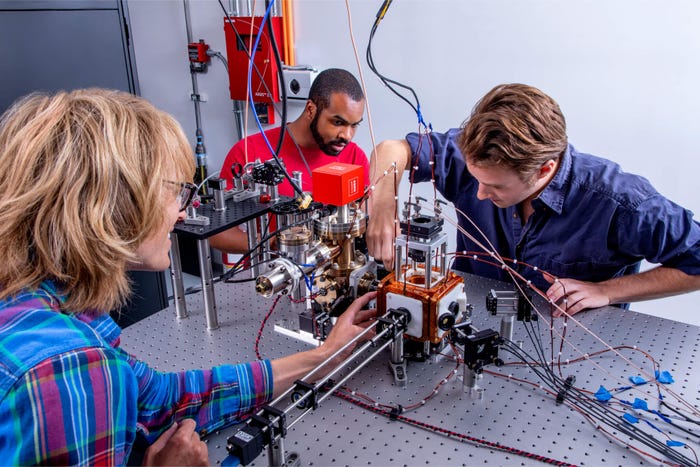
Connects decision-makers and solutions creators to what's next in quantum computing
Supercomputer Centers to Incorporate Nvidia Quantum Computing PlatformSupercomputer Centers to Incorporate Nvidia Quantum Computing Platform
Hybrid architecture will help develop AI, chemistry, energy, biology and simulation applications

Supercomputing sites in Germany, Japan and Poland plan to integrate Nvidia’s open-source platform to integrate and program quantum and classical processors as a single system.
The centers already have high-performance computing systems that use Nvidia CPUs and GPUs. The CUDA-Q platform would enable them to work in a hybrid environment with quantum processing units (QPUs).
The Jülich Supercomputing Center (JSC) at Forschungszentrum Jülich in Germany is integrating an IQM Quantum Computers QPU with its Jupiter supercomputer. Jupiter uses the Nvidia GH200 Grace Hopper Superchip, which combines GPU and CPU functionality.
JSC researchers plan to use the QPU to develop quantum applications for chemical simulations and optimization problems, and to demonstrate how classical supercomputers can be accelerated by quantum computers.
The ABCI-Q supercomputer at the National Institute of Advanced Industrial Science and Technology (AIST) in Japan also uses Hopper architecture and is incorporating a QPU from QuEra. It aims to enable researchers to investigate quantum applications in AI, energy and biology.
“Japan’s researchers will make progress toward practical quantum computing applications with the ABCI-Q quantum-classical accelerated supercomputer. Nvidia is helping these pioneers push the boundaries of quantum computing research,” said G-QuAT/AIST deputy director Masahiro Horibe.
Poland’s Poznan Supercomputing and Networking Center (PSNC) recently connected two Orca Computing photonic QPUs to a new supercomputer partition accelerated by Hopper.
“This collaboration heralds a new era of computational innovation in quantum computing. Aligning Orca with like-minded partners in quantum will unlock unprecedented capabilities in solving complex real-world problems across various disciplines, now and into the future,” said Orca Computing co-founder and CEO Richard Murray.
Nvidia director of quantum and HPC Tim Costa said that the tight integration of quantum with GPU supercomputing will enable “useful” quantum computing.
“Nvidia’s quantum computing platform equips pioneers such as AIST, JSC and PSNC to push the boundaries of scientific discovery and advance the state of the art in quantum-integrated supercomputing,” Costa added.
Read more about:
AsiaAbout the Author
You May Also Like






